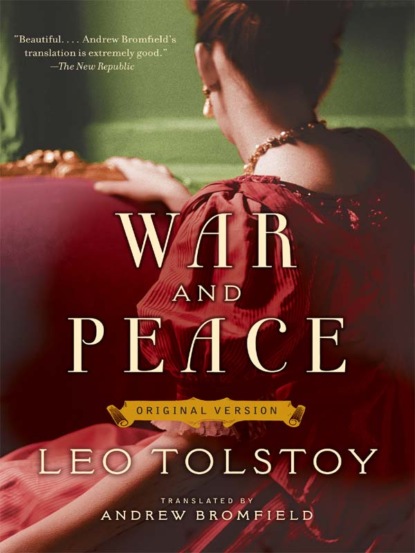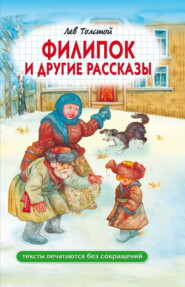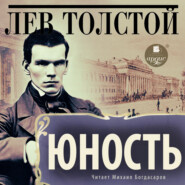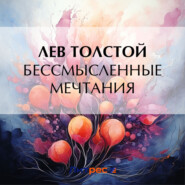По всем вопросам обращайтесь на: info@litportal.ru
(©) 2003-2025.
✖
War and Peace: Original Version
Автор
Год написания книги
2019
Настройки чтения
Размер шрифта
Высота строк
Поля
“No, I don’t want to,” said Pierre, faltering halfway through the glass. “Well, what’s going on?” he added with the expression of a man who has fulfilled his initial obligation and believes that he now has the right to join in the common pursuit.
“Drink it all, eh?” Anatole repeated, opening his eyes wider, lifting the unfinished glass in his white hand, his arm bared to the elbow. He had the look of a man doing something important, because at that moment he was focusing all his energy on holding the glass straight and saying exactly what he wanted to say.
“I told you, I don’t want to,” replied Pierre, putting on his spectacles and walking away.
“What are you shouting about?” he asked the crowd that had gathered round the window. Anatole stood and thought for a moment, handed the glass to a servant and, smiling with his lovely mouth, also went over to the window.
On Fridays Anatole Kuragin received everyone at his home, they played cards and ate supper there, then spent most of the night out. On that day the session of faro had developed into a protracted game for high stakes. Anatole had lost a little, and since he had no passion for gambling, but played out of habit, he had soon dropped out. One rich man, a life-hussar, had lost a lot, and one Semyonovsky Regiment officer, Dolokhov, had won from everyone. After the game they had sat down to supper very late. An extremely serious Englishman, who described himself as a traveller, had said that he had been given to believe that Russians drank far more heavily than he discovered they actually did. He had said that in Russia they drank nothing but champagne, but if they would drink rum, then he proposed a wager that he would drink more than anyone else present. Dolokhov, the officer who had won more than everyone else that evening, had said it wasn’t worth making a wager simply on a bottle of rum, and he had offered to drink the whole bottle without taking it from his lips, and also while sitting on the second-floor window-ledge with his legs dangling outside. The Englishman had proposed the wager. Anatole had accepted the wager for Dolokhov, that is, that Dolokhov would drink the full bottle of rum sitting on the ledge. Pierre came in just when the servants were starting to remove the frame that prevented anyone from sitting on the outside window-ledge. The second-storey window was high enough for someone falling from it to be killed. Drunken and amicable faces on all sides kept telling Pierre what was going on, as if it were particularly important for Pierre to know the state of affairs. Dolokhov was an officer in a Guards infantry regiment, of medium height, sinewy and solidly built, with a broad, full chest, extremely curly hair and light-blue eyes. He was about twenty-five. Like all infantry officers, he wore no moustache, and his mouth, the most striking feature of his face, was fully visible. It was an extremely agreeable mouth, despite the fact that it almost never smiled. The lines of this mouth were curved with remarkable subtlety. At its centre the upper lip pressed down vigorously on the firm lower one; sharp folds in the corners constantly formed something like two smiles, one on each side, and all of this, together with a direct, somewhat insolent, but ardent and intelligent gaze, produced such an extraordinary impression it made people wonder about the owner of such a beautiful and strange face. Women liked Dolokhov, and he was fully convinced there was no such thing as a woman whose character was entirely above reproach.
Dolokhov was a young man of good family, but not rich, although he lived extravagantly and gambled constantly. He almost always won; but no one, not even in his absence, dared to attribute his constant success to anything other than good luck, a clear mind and indomitable will-power. In their hearts, everyone who gambled with him assumed he was a card-sharp, although they did not dare to say so. Now, when he had proposed his strange wager, the drunken company took an especially keen interest in what he intended to do, precisely because those who knew him knew that he would do what he had said. Pierre also knew it and that was the only reason why he greeted Dolokhov without attempting to raise any objection to his intentions.
The rest of the company consisted of three officers, the Englishman, who had been seen in St. Petersburg in the most diverse circles, and a certain Moscow gambler, a fat married man who was much older than everyone else, and yet was on familiar terms with all these young people.
The bottle of rum had been brought; the frame that prevented anyone sitting on the sloping ledge of the window was being broken out by two servants in gaiters and kaftans, who were clearly working in haste, feeling intimidated by the shouted advice from the gentlemen surrounding them.
With his chest thrust out, his expression unchanging, neither walking round the others nor asking them to make way, Anatole forced his strong body through the crowd at the window, went up to the frame, wrapped both his white hands in a frock coat that was lying on a divan, and struck at the panes of glass, breaking them out.
“Now now, your excellency,” said a servant, “you’re only getting in the way and you’ll cut your hands.”
“Get out of it, you fool, eh?” said Anatole. He took hold of the crossbeam of the frame and began pulling. Several other hands also joined in; they pulled, and the frame sprang out of the window with a crack, so that those pulling it almost fell over.
“Out with it all, or they’ll think I’m holding on,” said Dolokhov.
“Listen,” Anatole said to Pierre. “You understand? The Englishman’s boasting … eh? … National pride? … Eh? … All right? …”
“All right,” said Pierre, gazing with a sinking heart at Dolokhov as, grasping the bottle of rum in his hands, he approached the window, through which could be seen the light of the sky, where dawn and dusk were merging. Rolling up the sleeves of his shirt purposefully after sticking the bottle of rum in his pocket, Dolokhov leapt smartly up to the window.
“Listen!” he shouted, standing on the sill and addressing the room.
Everybody stopped talking.
“I wager” (he spoke in French so that the Englishman would understand him, but he did not speak that language too well) “I wager fifty imperials … Want to make it a hundred?” he added, addressing the Englishman.
“No, fifty,” said the Englishman.
“All right, fifty imperials, that I will drink this whole bottle of rum without lifting it from my lips, and that I’ll drink it sitting outside the window, on this spot here” (he leaned out and pointed to the jutting slope of the wall outside the window) “and without holding on … Right?”
“Very good,” said the Englishman.
Anatole turned towards the Englishman and, grabbing him by the button of his tailcoat and looking down on him from above (the Englishman was short), he began explaining in English what was already clear to everyone.
“Stop!” cried Dolokhov, banging the bottle against the side of the window to draw attention to himself. “Stop, Kuragin, listen. If anyone else does the same, then I pay a hundred imperials. Understand?”
The Englishman nodded, without making it at all clear whether he intended to accept this new wager. Anatole kept hold of the Englishman and even though the latter tried to convey by nodding that he had understood everything, Anatole translated Dolokhov’s words into English for him. A young, skinny boy, a life-hussar who had lost that evening, climbed up into the window, stuck his head out and looked down.
“Oooh …” he exclaimed, looking out and down through the window to the stone of the pavement.
“Attention!” yelled Dolokhov and jerked the officer out of the window. He jumped awkwardly back down into the room, tripping over his tangled spurs.
Setting the bottle on the window-ledge so it would be easy to pick up, Dolokhov climbed cautiously and carefully out of the window. Lowering his legs and wedging himself against the sides of the window with both hands, he shifted his position, settled himself, lowered his hands, moved a little to the right, then to the left and took hold of the bottle. Anatole brought two candles and set them on the windowsill, although it was already quite light. Dolokhov’s back in the white shirt and his curly head were lit up from both sides. Everybody was crowding round the window. The Englishman was standing at the front. Pierre was smiling without speaking. The old Muscovite, his face frightened and angry, suddenly pushed forward, trying to grab Dolokhov by the shirt.
“Gentlemen, this is stupidity, he’ll fall and be killed,” he said. Anatole stopped him.
“Don’t touch him, you’ll startle him, he’ll be killed. Eh? … What then? … Eh?”
Dolokhov looked round, adjusting his position and once again wedging himself with his hands. His face was neither pale nor red, but cold and angry.
“If anyone tries to meddle again,” he said, uttering each word separately through thin, compressed lips, “I’ll chuck him down there right now. It’s slippery enough to slide right off, but he interferes with his stupid nonsense … Right!”
After saying “Right!” he turned back again, lowered his hands, picked up the bottle and raised it to his mouth, tilting his head back and throwing his free hand upwards for balance. One of the servants, who had begun clearing up the broken glass, stopped in a bent-over position with his eyes fixed on the window and Dolokhov’s back. Anatole stood up straight, his eyes wide open. The Englishman pursed his lips and watched from the side. The old Muscovite fled into the corner of the room and lay down on a divan with his face to the wall. Some stood still with their mouths open, some with their hands raised. Pierre covered his face, where a faint, forgotten smile still lingered, although it now expressed horror and fear. Nobody said a word. Pierre took his hands away from his eyes; Dolokhov was sitting in the same position, but his head was tilted right back so that the curly hair at the back touched the collar of his shirt and the hand holding the bottle was rising higher and higher, shuddering with the effort. The bottle was clearly emptying and at the same time rising higher, as his head tilted back. “What is taking so long?” thought Pierre. It seemed to him that more than half an hour had gone by. Suddenly Dolokhov leaned backwards bodily and his hand began shaking nervously: this shuddering was enough to shift his whole body sitting on the steep slope. He changed position and his hands and head began to shake even more strongly from the effort. One hand was raised to grab hold of the windowsill, but then lowered again. Pierre closed his eyes and told himself that he would not open them again. Suddenly he sensed everything around him beginning to stir. He peeped: Dolokhov was standing on the windowsill, his face pale and elated.
DOLOKHOV’S WAGER WITH THE ENGLISHMAN Drawing by M.S. Bashilov, 1866 (#ulink_a6d8f629-bfe0-5b4a-a76c-97b278d89ee5)
“Empty!”
He tossed the bottle to the Englishman, who deftly caught it. Then Dolokhov jumped down from the window. He smelled strongly of rum.
“Eh? How’s that? Eh?” Anatole asked everybody. “What a splendid trick!”
“To hell with the lot of you!” said the old Muscovite. The Englishman had taken out his purse and was counting out the money. Dolokhov was scowling in silence. Pierre, in a bewildered state, walked around the room, smiling and breathing heavily.
“Gentlemen, who wishes to wager with me? I’ll do the same,” he suddenly blurted out. “And I don’t even need a wager, so there. Tell them to give me a bottle. I’ll do it … tell them.”
“What are you saying? Have you lost your mind? Who’s going to let you? You get dizzy on the stairs,” voices said on every side.
“It was mean of us to leave Dolokhov to sacrifice his life alone. I’ll drink it, let me have a bottle of rum!” shouted Pierre, hammering on the table with a determined, drunken gesture, and he started clambering up to the window. They grabbed him by the arms and led him off to the next room. But Dolokhov was unable to walk; they carried him over to a divan and doused his head with cold water.
Someone wanted to go home, someone suggested not going home but on to somewhere else, all of them together: Pierre insisted on this more than anyone. They put on their cloaks and set off. The Englishman went home and Dolokhov fell into a half-dead, insensible sleep on Anatole’s divan.
XIII
Prince Vasily kept the promise that he had made to the elderly woman at Anna Pavlovna’s soirée who had petitioned him about her only son Boris. His Majesty was informed of him and, unlike other young men, he was transferred to the Semyonovsky Guards regiment as an ensign. But Boris was not appointed an adjutant or attached to Kutuzov, for all Anna Mikhailovna’s soliciting and scheming. Shortly after Anna Pavlovna’s soirée, Anna Mikhailovna went back to Moscow, straight to her rich relatives the Rostovs, with whom she stayed in Moscow and in whose house her adored little Borenka had been educated since he was a child and had lived for years. Now, though he had only just been taken into the army, he had immediately been made a Guards ensign. The Guards had already left St. Petersburg on the 10th of August and her son, who had remained in Moscow to be fitted for his uniform, was due to catch them up on the road to Radzivilov.
It was the name-day of two members of the Rostov family – the mother and her youngest daughter, both called Natalya. All morning, teams of horses had been constantly driving up and away, bringing well-wishers to Countess Rostova’s large house on Povarskaya Street, which was known to the whole of Moscow. The countess and her elder daughter sat in the drawing room with the guests, who endlessly came and went. The countess was a woman with a thin, oriental-looking face, about forty-five years old, clearly exhausted by her children, of whom she had had twelve. A slowness in her movements and speech, due to her frailty, lent her a grave air that inspired respect. As part of the household, Princess Anna Mikhailovna Drubetskaya sat beside her, helping with the business of receiving the guests and engaging them in conversation. The young people were in the back rooms, feeling no need to participate in the receiving of visits. The count was greeting and seeing off the guests and inviting them to dinner.
“I am very, very grateful, ma chère or mon cher” (he said ma chère or mon cher to everyone without exception, making not the slightest distinction between people of higher or lower standing than himself), “for myself and for my dear name-day girls. Be sure to come for dinner, now. I cordially invite you on behalf of the whole family, ma chère.”
He spoke these words to everyone without exception or variation, with an identical expression on his plump, jolly, clean-shaven face, and with an identically firm handshake and repeated short bows. After seeing off one guest, the count went back to another who was still in the drawing room: drawing up an armchair and with the air of a man who likes and knows how to enjoy life, rakishly planting his feet wide apart and setting his hands on his knees, he swayed impressively, ventured conjectures concerning the weather and consulted people about his health, sometimes in Russian, sometimes in very bad but self-assured French, then once again, with the air of a man who is tired but resolute in the fulfilment of his duty, went to see the guest off, arranging the sparse grey hairs on his bald patch, and once again invited the guest to dinner. Sometimes on his way back from the hallway he went via the conservatory and the footmen’s room to look into the large marble hall, where they were laying the table for eighty places and, looking at the footmen carrying the silver and porcelain, extending the tables and spreading out the damask tablecloths, he called over Dmitri Vasilievich, the nobleman’s son who managed all his affairs and said:
“Right, Mitenka, now you make sure everything is all right. Good, good,” he said, surveying with satisfaction the huge extended table. “And don’t forget the order of the wines; the whole thing is in the serving. See to it …” And he walked away, sighing complacently, back to the drawing room.
“Marya Lvovna Karagina and her daughter!” the countess’s huge footman announced in a deep bass as he stepped through the doors of the drawing room.
The countess thought for a moment and took a sniff from a gold snuffbox decorated with a portrait of her husband.
“These visits have quite worn me out,” she said. “Well then, she shall be the last I receive. She is very prim and proper. Show her in,” she said to her servant in a sad voice, as if she were saying: “Very well then, finish me off.”
A tall, plump lady with a proud face and her pretty little daughter entered the drawing room in a rustling of dresses.

















